Tracing the Development of English Language: Changes and Influences
VerifiedAdded on 2022/09/12
|8
|2427
|13
Essay
AI Summary
This essay provides a comprehensive overview of the development of the English language, tracing its evolution from the post-1450 period to the present day. It focuses on the significant impact of the Great Vowel Shift, examining how this phonological change affected pronunciation and spelling. The essay further explores the influence of various languages, including Latin, Greek, French, and Scandinavian, on the English vocabulary and grammar. It also discusses the standardization of English, the emergence of American English, and the ongoing changes driven by globalization and technological advancements. The analysis highlights differences in vocabulary and spelling between British and American English and anticipates future trends in the language, such as the increasing influence of colloquialisms, the impact of technology, and the continued assimilation of foreign words and phrases. The paper concludes by emphasizing the dynamic nature of the English language and its capacity to adapt and evolve.
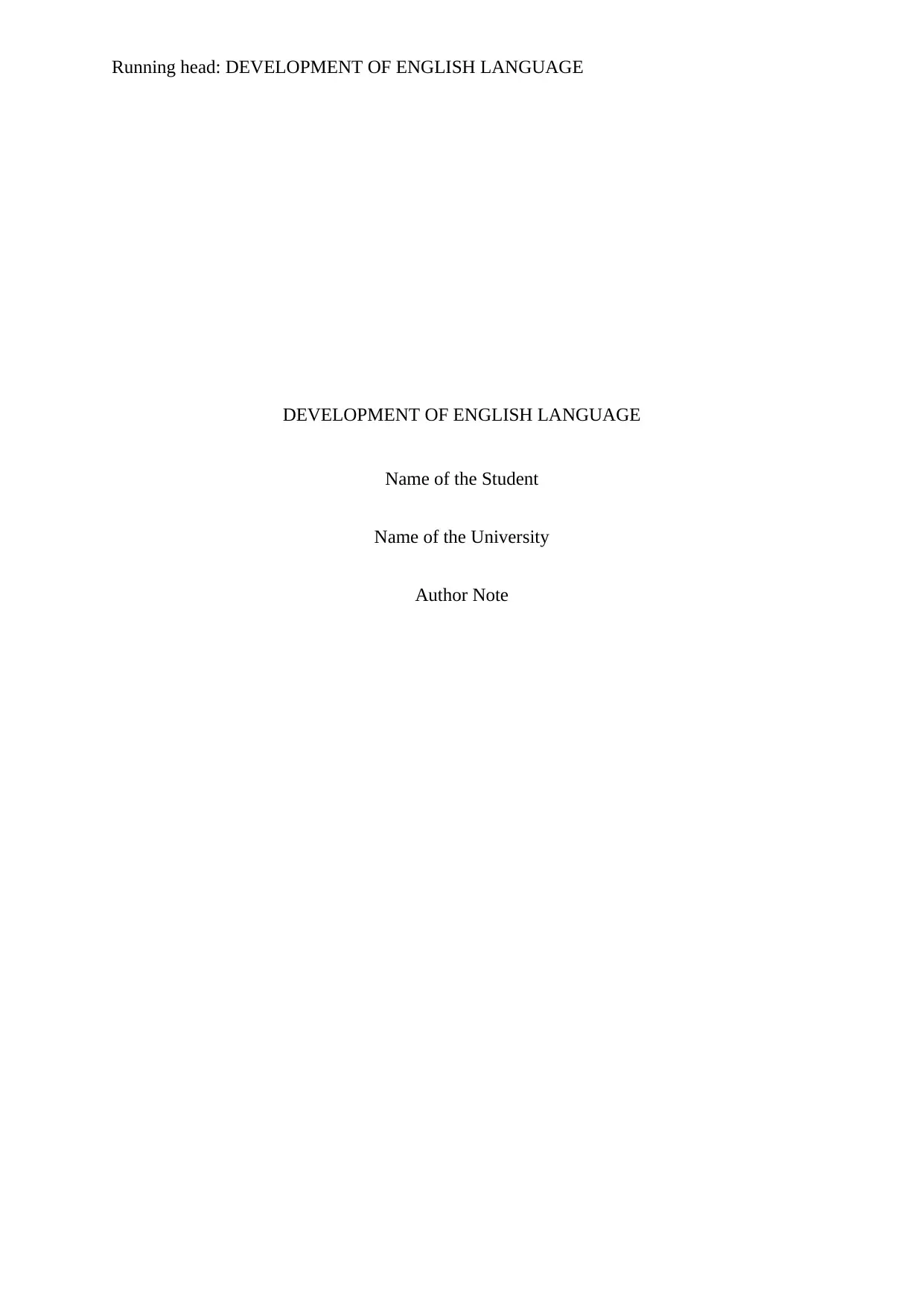
Running head: DEVELOPMENT OF ENGLISH LANGUAGE
DEVELOPMENT OF ENGLISH LANGUAGE
Name of the Student
Name of the University
Author Note
DEVELOPMENT OF ENGLISH LANGUAGE
Name of the Student
Name of the University
Author Note
Paraphrase This Document
Need a fresh take? Get an instant paraphrase of this document with our AI Paraphraser
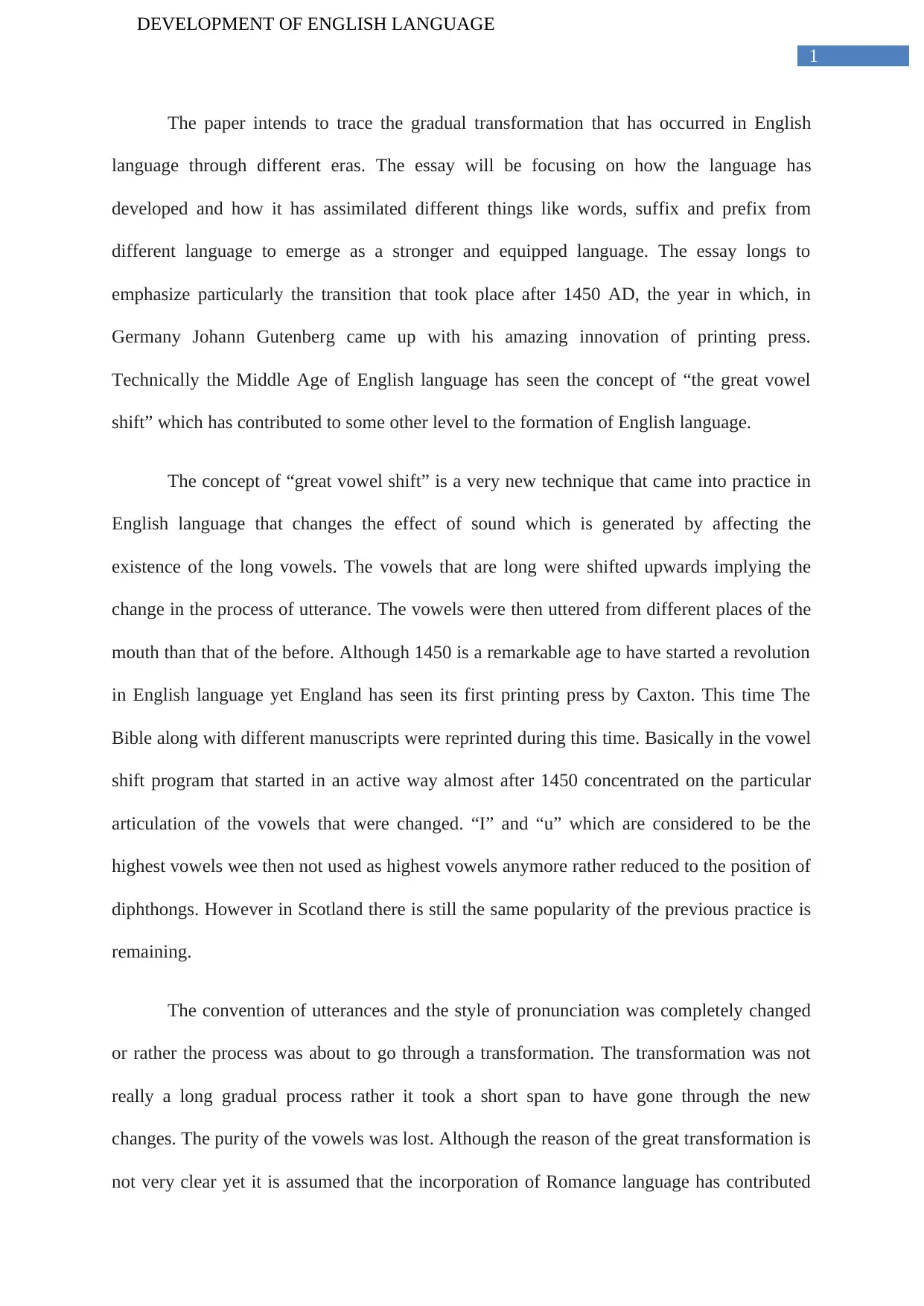
1
DEVELOPMENT OF ENGLISH LANGUAGE
The paper intends to trace the gradual transformation that has occurred in English
language through different eras. The essay will be focusing on how the language has
developed and how it has assimilated different things like words, suffix and prefix from
different language to emerge as a stronger and equipped language. The essay longs to
emphasize particularly the transition that took place after 1450 AD, the year in which, in
Germany Johann Gutenberg came up with his amazing innovation of printing press.
Technically the Middle Age of English language has seen the concept of “the great vowel
shift” which has contributed to some other level to the formation of English language.
The concept of “great vowel shift” is a very new technique that came into practice in
English language that changes the effect of sound which is generated by affecting the
existence of the long vowels. The vowels that are long were shifted upwards implying the
change in the process of utterance. The vowels were then uttered from different places of the
mouth than that of the before. Although 1450 is a remarkable age to have started a revolution
in English language yet England has seen its first printing press by Caxton. This time The
Bible along with different manuscripts were reprinted during this time. Basically in the vowel
shift program that started in an active way almost after 1450 concentrated on the particular
articulation of the vowels that were changed. “I” and “u” which are considered to be the
highest vowels wee then not used as highest vowels anymore rather reduced to the position of
diphthongs. However in Scotland there is still the same popularity of the previous practice is
remaining.
The convention of utterances and the style of pronunciation was completely changed
or rather the process was about to go through a transformation. The transformation was not
really a long gradual process rather it took a short span to have gone through the new
changes. The purity of the vowels was lost. Although the reason of the great transformation is
not very clear yet it is assumed that the incorporation of Romance language has contributed
DEVELOPMENT OF ENGLISH LANGUAGE
The paper intends to trace the gradual transformation that has occurred in English
language through different eras. The essay will be focusing on how the language has
developed and how it has assimilated different things like words, suffix and prefix from
different language to emerge as a stronger and equipped language. The essay longs to
emphasize particularly the transition that took place after 1450 AD, the year in which, in
Germany Johann Gutenberg came up with his amazing innovation of printing press.
Technically the Middle Age of English language has seen the concept of “the great vowel
shift” which has contributed to some other level to the formation of English language.
The concept of “great vowel shift” is a very new technique that came into practice in
English language that changes the effect of sound which is generated by affecting the
existence of the long vowels. The vowels that are long were shifted upwards implying the
change in the process of utterance. The vowels were then uttered from different places of the
mouth than that of the before. Although 1450 is a remarkable age to have started a revolution
in English language yet England has seen its first printing press by Caxton. This time The
Bible along with different manuscripts were reprinted during this time. Basically in the vowel
shift program that started in an active way almost after 1450 concentrated on the particular
articulation of the vowels that were changed. “I” and “u” which are considered to be the
highest vowels wee then not used as highest vowels anymore rather reduced to the position of
diphthongs. However in Scotland there is still the same popularity of the previous practice is
remaining.
The convention of utterances and the style of pronunciation was completely changed
or rather the process was about to go through a transformation. The transformation was not
really a long gradual process rather it took a short span to have gone through the new
changes. The purity of the vowels was lost. Although the reason of the great transformation is
not very clear yet it is assumed that the incorporation of Romance language has contributed
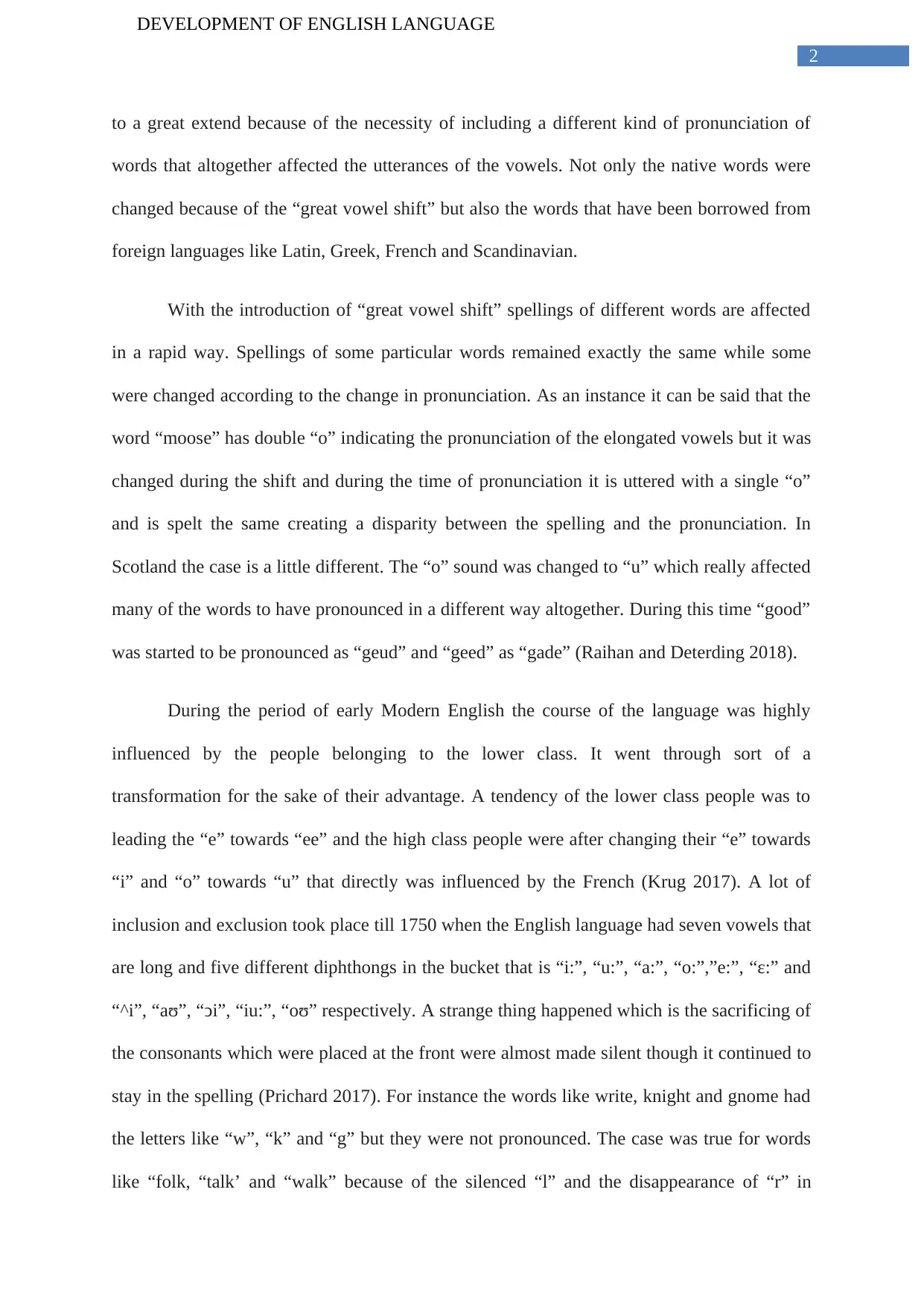
2
DEVELOPMENT OF ENGLISH LANGUAGE
to a great extend because of the necessity of including a different kind of pronunciation of
words that altogether affected the utterances of the vowels. Not only the native words were
changed because of the “great vowel shift” but also the words that have been borrowed from
foreign languages like Latin, Greek, French and Scandinavian.
With the introduction of “great vowel shift” spellings of different words are affected
in a rapid way. Spellings of some particular words remained exactly the same while some
were changed according to the change in pronunciation. As an instance it can be said that the
word “moose” has double “o” indicating the pronunciation of the elongated vowels but it was
changed during the shift and during the time of pronunciation it is uttered with a single “o”
and is spelt the same creating a disparity between the spelling and the pronunciation. In
Scotland the case is a little different. The “o” sound was changed to “u” which really affected
many of the words to have pronounced in a different way altogether. During this time “good”
was started to be pronounced as “geud” and “geed” as “gade” (Raihan and Deterding 2018).
During the period of early Modern English the course of the language was highly
influenced by the people belonging to the lower class. It went through sort of a
transformation for the sake of their advantage. A tendency of the lower class people was to
leading the “e” towards “ee” and the high class people were after changing their “e” towards
“i” and “o” towards “u” that directly was influenced by the French (Krug 2017). A lot of
inclusion and exclusion took place till 1750 when the English language had seven vowels that
are long and five different diphthongs in the bucket that is “i:”, “u:”, “a:”, “o:”,”e:”, “ɛ:” and
“^i”, “aʊ”, “ͻi”, “iu:”, “oʊ” respectively. A strange thing happened which is the sacrificing of
the consonants which were placed at the front were almost made silent though it continued to
stay in the spelling (Prichard 2017). For instance the words like write, knight and gnome had
the letters like “w”, “k” and “g” but they were not pronounced. The case was true for words
like “folk, “talk’ and “walk” because of the silenced “l” and the disappearance of “r” in
DEVELOPMENT OF ENGLISH LANGUAGE
to a great extend because of the necessity of including a different kind of pronunciation of
words that altogether affected the utterances of the vowels. Not only the native words were
changed because of the “great vowel shift” but also the words that have been borrowed from
foreign languages like Latin, Greek, French and Scandinavian.
With the introduction of “great vowel shift” spellings of different words are affected
in a rapid way. Spellings of some particular words remained exactly the same while some
were changed according to the change in pronunciation. As an instance it can be said that the
word “moose” has double “o” indicating the pronunciation of the elongated vowels but it was
changed during the shift and during the time of pronunciation it is uttered with a single “o”
and is spelt the same creating a disparity between the spelling and the pronunciation. In
Scotland the case is a little different. The “o” sound was changed to “u” which really affected
many of the words to have pronounced in a different way altogether. During this time “good”
was started to be pronounced as “geud” and “geed” as “gade” (Raihan and Deterding 2018).
During the period of early Modern English the course of the language was highly
influenced by the people belonging to the lower class. It went through sort of a
transformation for the sake of their advantage. A tendency of the lower class people was to
leading the “e” towards “ee” and the high class people were after changing their “e” towards
“i” and “o” towards “u” that directly was influenced by the French (Krug 2017). A lot of
inclusion and exclusion took place till 1750 when the English language had seven vowels that
are long and five different diphthongs in the bucket that is “i:”, “u:”, “a:”, “o:”,”e:”, “ɛ:” and
“^i”, “aʊ”, “ͻi”, “iu:”, “oʊ” respectively. A strange thing happened which is the sacrificing of
the consonants which were placed at the front were almost made silent though it continued to
stay in the spelling (Prichard 2017). For instance the words like write, knight and gnome had
the letters like “w”, “k” and “g” but they were not pronounced. The case was true for words
like “folk, “talk’ and “walk” because of the silenced “l” and the disappearance of “r” in
⊘ This is a preview!⊘
Do you want full access?
Subscribe today to unlock all pages.

Trusted by 1+ million students worldwide
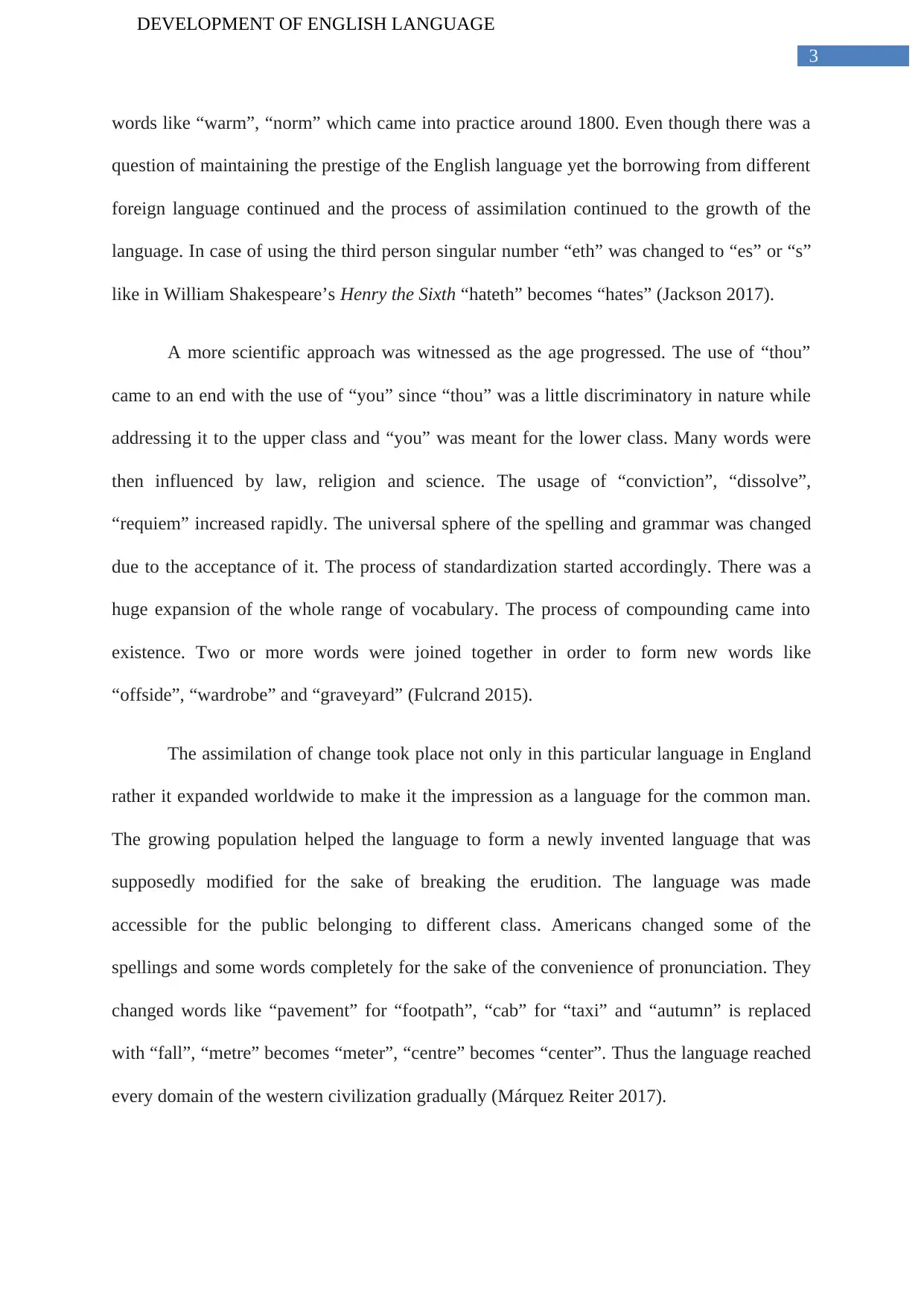
3
DEVELOPMENT OF ENGLISH LANGUAGE
words like “warm”, “norm” which came into practice around 1800. Even though there was a
question of maintaining the prestige of the English language yet the borrowing from different
foreign language continued and the process of assimilation continued to the growth of the
language. In case of using the third person singular number “eth” was changed to “es” or “s”
like in William Shakespeare’s Henry the Sixth “hateth” becomes “hates” (Jackson 2017).
A more scientific approach was witnessed as the age progressed. The use of “thou”
came to an end with the use of “you” since “thou” was a little discriminatory in nature while
addressing it to the upper class and “you” was meant for the lower class. Many words were
then influenced by law, religion and science. The usage of “conviction”, “dissolve”,
“requiem” increased rapidly. The universal sphere of the spelling and grammar was changed
due to the acceptance of it. The process of standardization started accordingly. There was a
huge expansion of the whole range of vocabulary. The process of compounding came into
existence. Two or more words were joined together in order to form new words like
“offside”, “wardrobe” and “graveyard” (Fulcrand 2015).
The assimilation of change took place not only in this particular language in England
rather it expanded worldwide to make it the impression as a language for the common man.
The growing population helped the language to form a newly invented language that was
supposedly modified for the sake of breaking the erudition. The language was made
accessible for the public belonging to different class. Americans changed some of the
spellings and some words completely for the sake of the convenience of pronunciation. They
changed words like “pavement” for “footpath”, “cab” for “taxi” and “autumn” is replaced
with “fall”, “metre” becomes “meter”, “centre” becomes “center”. Thus the language reached
every domain of the western civilization gradually (Márquez Reiter 2017).
DEVELOPMENT OF ENGLISH LANGUAGE
words like “warm”, “norm” which came into practice around 1800. Even though there was a
question of maintaining the prestige of the English language yet the borrowing from different
foreign language continued and the process of assimilation continued to the growth of the
language. In case of using the third person singular number “eth” was changed to “es” or “s”
like in William Shakespeare’s Henry the Sixth “hateth” becomes “hates” (Jackson 2017).
A more scientific approach was witnessed as the age progressed. The use of “thou”
came to an end with the use of “you” since “thou” was a little discriminatory in nature while
addressing it to the upper class and “you” was meant for the lower class. Many words were
then influenced by law, religion and science. The usage of “conviction”, “dissolve”,
“requiem” increased rapidly. The universal sphere of the spelling and grammar was changed
due to the acceptance of it. The process of standardization started accordingly. There was a
huge expansion of the whole range of vocabulary. The process of compounding came into
existence. Two or more words were joined together in order to form new words like
“offside”, “wardrobe” and “graveyard” (Fulcrand 2015).
The assimilation of change took place not only in this particular language in England
rather it expanded worldwide to make it the impression as a language for the common man.
The growing population helped the language to form a newly invented language that was
supposedly modified for the sake of breaking the erudition. The language was made
accessible for the public belonging to different class. Americans changed some of the
spellings and some words completely for the sake of the convenience of pronunciation. They
changed words like “pavement” for “footpath”, “cab” for “taxi” and “autumn” is replaced
with “fall”, “metre” becomes “meter”, “centre” becomes “center”. Thus the language reached
every domain of the western civilization gradually (Márquez Reiter 2017).
Paraphrase This Document
Need a fresh take? Get an instant paraphrase of this document with our AI Paraphraser
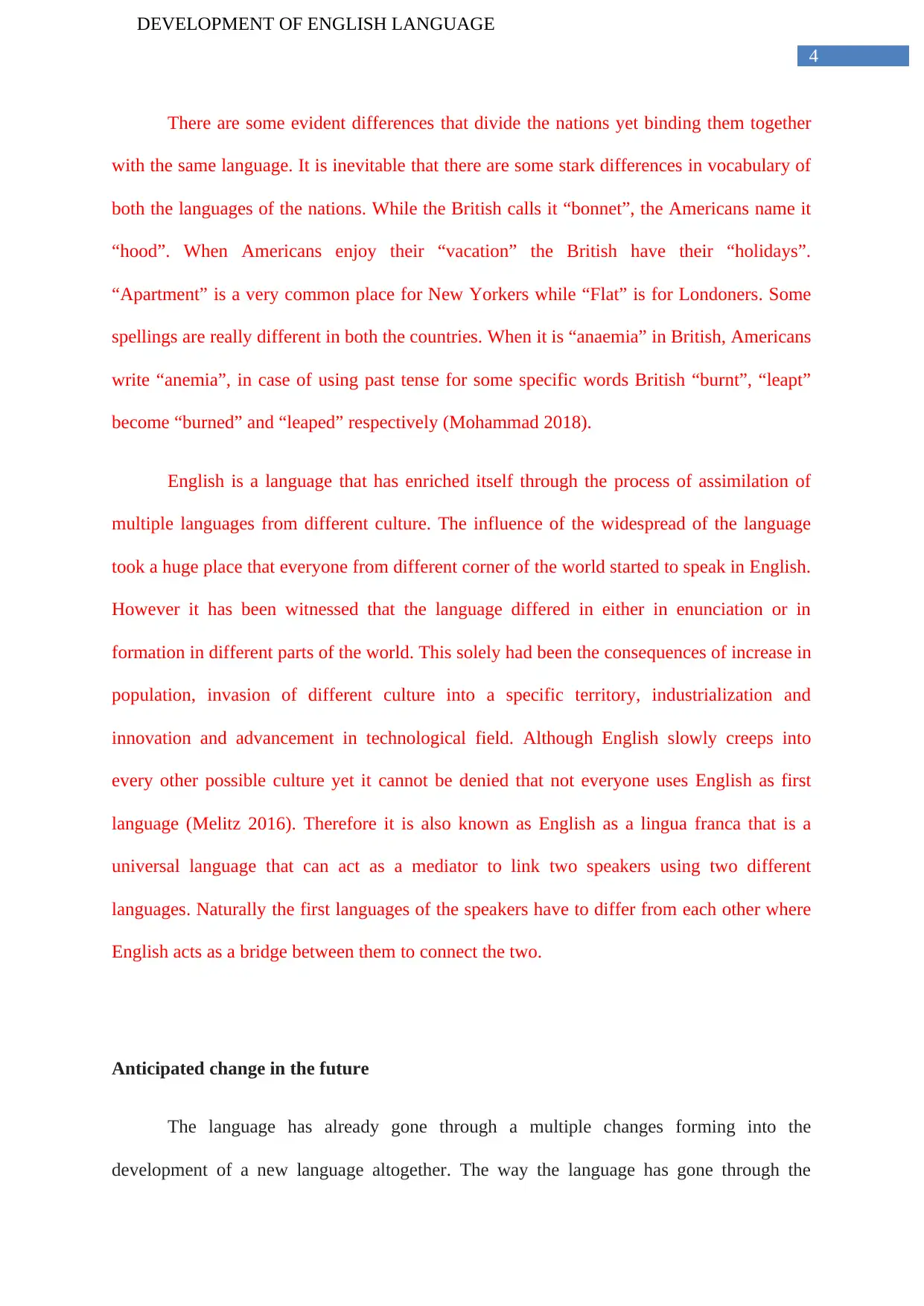
4
DEVELOPMENT OF ENGLISH LANGUAGE
There are some evident differences that divide the nations yet binding them together
with the same language. It is inevitable that there are some stark differences in vocabulary of
both the languages of the nations. While the British calls it “bonnet”, the Americans name it
“hood”. When Americans enjoy their “vacation” the British have their “holidays”.
“Apartment” is a very common place for New Yorkers while “Flat” is for Londoners. Some
spellings are really different in both the countries. When it is “anaemia” in British, Americans
write “anemia”, in case of using past tense for some specific words British “burnt”, “leapt”
become “burned” and “leaped” respectively (Mohammad 2018).
English is a language that has enriched itself through the process of assimilation of
multiple languages from different culture. The influence of the widespread of the language
took a huge place that everyone from different corner of the world started to speak in English.
However it has been witnessed that the language differed in either in enunciation or in
formation in different parts of the world. This solely had been the consequences of increase in
population, invasion of different culture into a specific territory, industrialization and
innovation and advancement in technological field. Although English slowly creeps into
every other possible culture yet it cannot be denied that not everyone uses English as first
language (Melitz 2016). Therefore it is also known as English as a lingua franca that is a
universal language that can act as a mediator to link two speakers using two different
languages. Naturally the first languages of the speakers have to differ from each other where
English acts as a bridge between them to connect the two.
Anticipated change in the future
The language has already gone through a multiple changes forming into the
development of a new language altogether. The way the language has gone through the
DEVELOPMENT OF ENGLISH LANGUAGE
There are some evident differences that divide the nations yet binding them together
with the same language. It is inevitable that there are some stark differences in vocabulary of
both the languages of the nations. While the British calls it “bonnet”, the Americans name it
“hood”. When Americans enjoy their “vacation” the British have their “holidays”.
“Apartment” is a very common place for New Yorkers while “Flat” is for Londoners. Some
spellings are really different in both the countries. When it is “anaemia” in British, Americans
write “anemia”, in case of using past tense for some specific words British “burnt”, “leapt”
become “burned” and “leaped” respectively (Mohammad 2018).
English is a language that has enriched itself through the process of assimilation of
multiple languages from different culture. The influence of the widespread of the language
took a huge place that everyone from different corner of the world started to speak in English.
However it has been witnessed that the language differed in either in enunciation or in
formation in different parts of the world. This solely had been the consequences of increase in
population, invasion of different culture into a specific territory, industrialization and
innovation and advancement in technological field. Although English slowly creeps into
every other possible culture yet it cannot be denied that not everyone uses English as first
language (Melitz 2016). Therefore it is also known as English as a lingua franca that is a
universal language that can act as a mediator to link two speakers using two different
languages. Naturally the first languages of the speakers have to differ from each other where
English acts as a bridge between them to connect the two.
Anticipated change in the future
The language has already gone through a multiple changes forming into the
development of a new language altogether. The way the language has gone through the
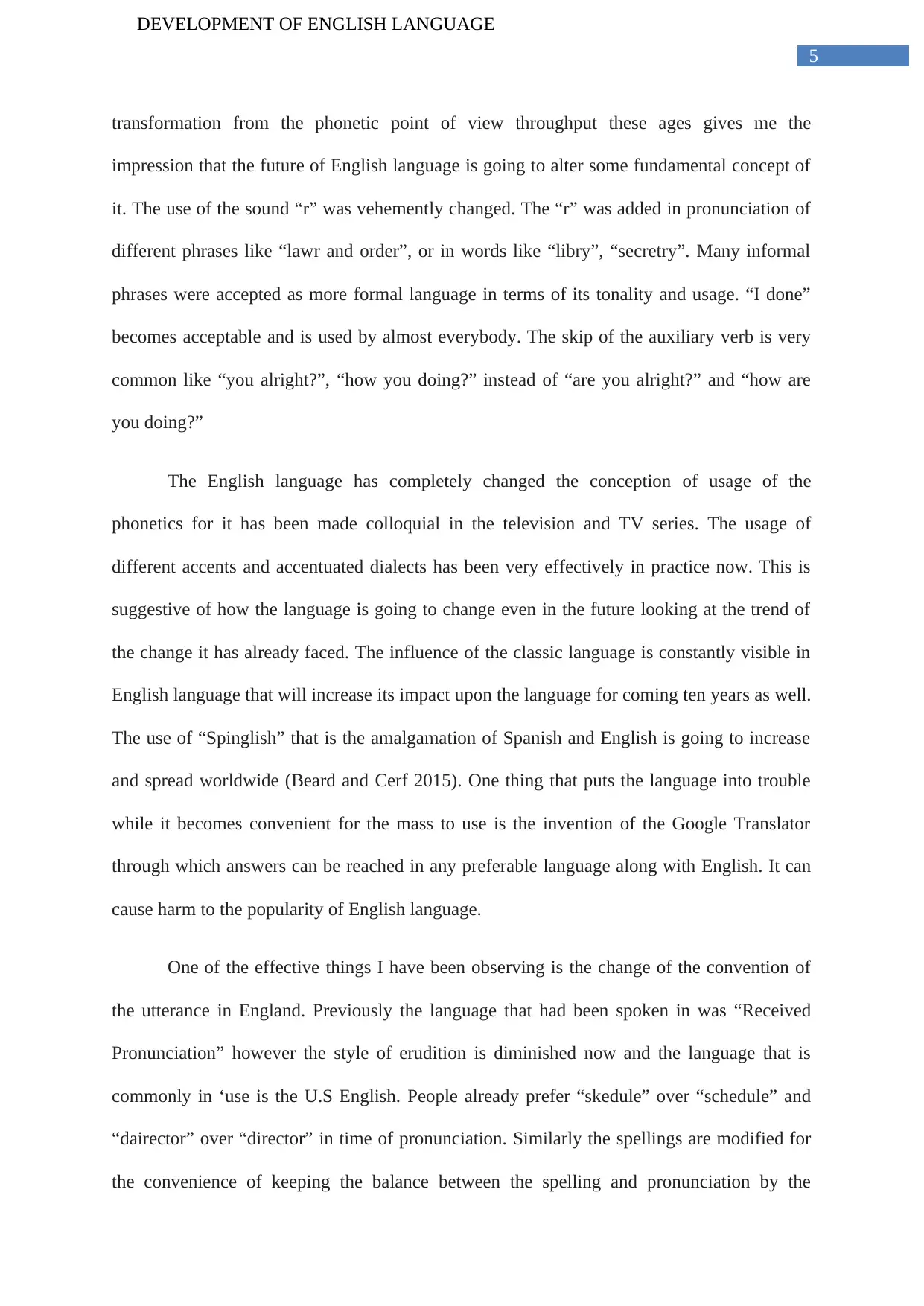
5
DEVELOPMENT OF ENGLISH LANGUAGE
transformation from the phonetic point of view throughput these ages gives me the
impression that the future of English language is going to alter some fundamental concept of
it. The use of the sound “r” was vehemently changed. The “r” was added in pronunciation of
different phrases like “lawr and order”, or in words like “libry”, “secretry”. Many informal
phrases were accepted as more formal language in terms of its tonality and usage. “I done”
becomes acceptable and is used by almost everybody. The skip of the auxiliary verb is very
common like “you alright?”, “how you doing?” instead of “are you alright?” and “how are
you doing?”
The English language has completely changed the conception of usage of the
phonetics for it has been made colloquial in the television and TV series. The usage of
different accents and accentuated dialects has been very effectively in practice now. This is
suggestive of how the language is going to change even in the future looking at the trend of
the change it has already faced. The influence of the classic language is constantly visible in
English language that will increase its impact upon the language for coming ten years as well.
The use of “Spinglish” that is the amalgamation of Spanish and English is going to increase
and spread worldwide (Beard and Cerf 2015). One thing that puts the language into trouble
while it becomes convenient for the mass to use is the invention of the Google Translator
through which answers can be reached in any preferable language along with English. It can
cause harm to the popularity of English language.
One of the effective things I have been observing is the change of the convention of
the utterance in England. Previously the language that had been spoken in was “Received
Pronunciation” however the style of erudition is diminished now and the language that is
commonly in ‘use is the U.S English. People already prefer “skedule” over “schedule” and
“dairector” over “director” in time of pronunciation. Similarly the spellings are modified for
the convenience of keeping the balance between the spelling and pronunciation by the
DEVELOPMENT OF ENGLISH LANGUAGE
transformation from the phonetic point of view throughput these ages gives me the
impression that the future of English language is going to alter some fundamental concept of
it. The use of the sound “r” was vehemently changed. The “r” was added in pronunciation of
different phrases like “lawr and order”, or in words like “libry”, “secretry”. Many informal
phrases were accepted as more formal language in terms of its tonality and usage. “I done”
becomes acceptable and is used by almost everybody. The skip of the auxiliary verb is very
common like “you alright?”, “how you doing?” instead of “are you alright?” and “how are
you doing?”
The English language has completely changed the conception of usage of the
phonetics for it has been made colloquial in the television and TV series. The usage of
different accents and accentuated dialects has been very effectively in practice now. This is
suggestive of how the language is going to change even in the future looking at the trend of
the change it has already faced. The influence of the classic language is constantly visible in
English language that will increase its impact upon the language for coming ten years as well.
The use of “Spinglish” that is the amalgamation of Spanish and English is going to increase
and spread worldwide (Beard and Cerf 2015). One thing that puts the language into trouble
while it becomes convenient for the mass to use is the invention of the Google Translator
through which answers can be reached in any preferable language along with English. It can
cause harm to the popularity of English language.
One of the effective things I have been observing is the change of the convention of
the utterance in England. Previously the language that had been spoken in was “Received
Pronunciation” however the style of erudition is diminished now and the language that is
commonly in ‘use is the U.S English. People already prefer “skedule” over “schedule” and
“dairector” over “director” in time of pronunciation. Similarly the spellings are modified for
the convenience of keeping the balance between the spelling and pronunciation by the
⊘ This is a preview!⊘
Do you want full access?
Subscribe today to unlock all pages.

Trusted by 1+ million students worldwide

6
DEVELOPMENT OF ENGLISH LANGUAGE
Americans are “dialog”, “favorite” instead of “dialogue”, “favourite”. Mostly these spellings
are authorized in computer for which the children will automatically learn the modified
English. I have noticed the way the expression is changed with the usage of different style in
the language like the use of capital letter implying the expression of anger or wrath while the
incorrect spelling denotes humor. These things are already in practice and will bring in some
more changes that can be expected altogether.
DEVELOPMENT OF ENGLISH LANGUAGE
Americans are “dialog”, “favorite” instead of “dialogue”, “favourite”. Mostly these spellings
are authorized in computer for which the children will automatically learn the modified
English. I have noticed the way the expression is changed with the usage of different style in
the language like the use of capital letter implying the expression of anger or wrath while the
incorrect spelling denotes humor. These things are already in practice and will bring in some
more changes that can be expected altogether.
Paraphrase This Document
Need a fresh take? Get an instant paraphrase of this document with our AI Paraphraser
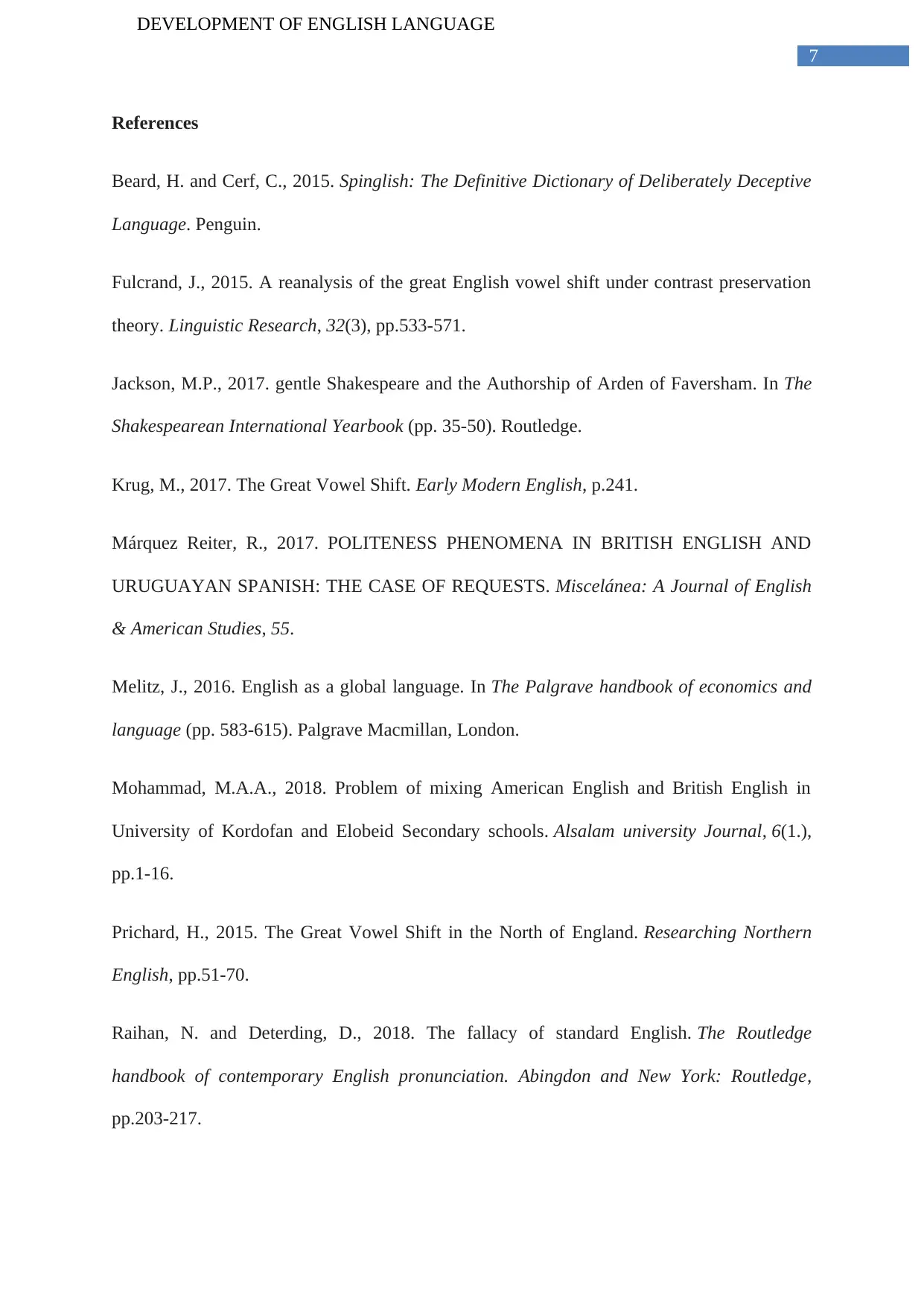
7
DEVELOPMENT OF ENGLISH LANGUAGE
References
Beard, H. and Cerf, C., 2015. Spinglish: The Definitive Dictionary of Deliberately Deceptive
Language. Penguin.
Fulcrand, J., 2015. A reanalysis of the great English vowel shift under contrast preservation
theory. Linguistic Research, 32(3), pp.533-571.
Jackson, M.P., 2017. gentle Shakespeare and the Authorship of Arden of Faversham. In The
Shakespearean International Yearbook (pp. 35-50). Routledge.
Krug, M., 2017. The Great Vowel Shift. Early Modern English, p.241.
Márquez Reiter, R., 2017. POLITENESS PHENOMENA IN BRITISH ENGLISH AND
URUGUAYAN SPANISH: THE CASE OF REQUESTS. Miscelánea: A Journal of English
& American Studies, 55.
Melitz, J., 2016. English as a global language. In The Palgrave handbook of economics and
language (pp. 583-615). Palgrave Macmillan, London.
Mohammad, M.A.A., 2018. Problem of mixing American English and British English in
University of Kordofan and Elobeid Secondary schools. Alsalam university Journal, 6(1.),
pp.1-16.
Prichard, H., 2015. The Great Vowel Shift in the North of England. Researching Northern
English, pp.51-70.
Raihan, N. and Deterding, D., 2018. The fallacy of standard English. The Routledge
handbook of contemporary English pronunciation. Abingdon and New York: Routledge,
pp.203-217.
DEVELOPMENT OF ENGLISH LANGUAGE
References
Beard, H. and Cerf, C., 2015. Spinglish: The Definitive Dictionary of Deliberately Deceptive
Language. Penguin.
Fulcrand, J., 2015. A reanalysis of the great English vowel shift under contrast preservation
theory. Linguistic Research, 32(3), pp.533-571.
Jackson, M.P., 2017. gentle Shakespeare and the Authorship of Arden of Faversham. In The
Shakespearean International Yearbook (pp. 35-50). Routledge.
Krug, M., 2017. The Great Vowel Shift. Early Modern English, p.241.
Márquez Reiter, R., 2017. POLITENESS PHENOMENA IN BRITISH ENGLISH AND
URUGUAYAN SPANISH: THE CASE OF REQUESTS. Miscelánea: A Journal of English
& American Studies, 55.
Melitz, J., 2016. English as a global language. In The Palgrave handbook of economics and
language (pp. 583-615). Palgrave Macmillan, London.
Mohammad, M.A.A., 2018. Problem of mixing American English and British English in
University of Kordofan and Elobeid Secondary schools. Alsalam university Journal, 6(1.),
pp.1-16.
Prichard, H., 2015. The Great Vowel Shift in the North of England. Researching Northern
English, pp.51-70.
Raihan, N. and Deterding, D., 2018. The fallacy of standard English. The Routledge
handbook of contemporary English pronunciation. Abingdon and New York: Routledge,
pp.203-217.
1 out of 8
Related Documents
Your All-in-One AI-Powered Toolkit for Academic Success.
+13062052269
info@desklib.com
Available 24*7 on WhatsApp / Email
![[object Object]](/_next/static/media/star-bottom.7253800d.svg)
Unlock your academic potential
Copyright © 2020–2026 A2Z Services. All Rights Reserved. Developed and managed by ZUCOL.




